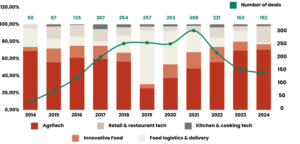Although AI has been in development for several years, it wasn’t until the release of Chat GPT to the general public in 2022 that its full potential became widely recognized, although it had previously been applied to multiple fields across industries.
In the agri food tech industry, AI has been making significant inroads into all phases of the food value chain, with investment remarkably growing from 2014.
In this article, we will explore the points in each segment where AI is currently making an impact, as well as other AI-based solutions that are expected to develop in the future.
The next graph displays the percentage of AI-related investment applied to each segment of the value chain, as well as the total number of rounds considered, which grew considerably until 2021 and then decreased – although the average round size has considerably increased since then.
Distribution of AI investment and number of deals across food segments

Source: Elaborated by Eatable Adventures, based on Dealroom data, 2024.
Agritech
Agritech is undoubtedly the leading segment for AI investment, capturing 70% of total funding. The primary applications of AI in this sector include robotics and automation, with autonomous equipment performing tasks such as irrigation and harvesting without human intervention. Precision farming is another key area, where AI-powered analytics solutions offer disease detection in crops, animal health monitoring, crop yield prediction, weather pattern analysis, and supply and demand forecasting, among others.
Major companies like Microsoft and Google are developing various AI solutions in Agritech, and investment in this area is expected to grow in the coming years.
The benefits of AI are clear as farms move towards complete autonomy. However, the main challenge lies in democratizing this costly technology, particularly in developing countries. Without access, these regions risk falling behind in competitiveness compared to those with means to adopt advanced AI solutions.
In-store retail & restaurant tech
In retail & restaurant tech, AI investment has been limited, but in 2024 has been predicted to account for almost 20% of total investment. However, it is the sector where AI implementation is most straightforward, leveraging retail analytics platforms and AI-powered order management systems to enhance real-time decision-making and streamline operations.
Looking ahead, future investments will focus on automating POS systems, deploying robots to manage orders within establishments, and establishing autonomous shops.
Innovative food
Innovative food constitutes the third-largest sector in terms of investment, capturing 6% of total funding, but has experienced a contraction since 2021. This sector encompasses two primary areas: the B2B production of ingredients, and the development of final products of these products by end-consumers.
Currently, the influence of AI in this segment is not so evident, but some advancements have been made related to the information management during the production of ingredients and other elements, as well as in precision fermentation processes. AI is expected to serve as a supportive tool in biotechnological advancements. Regarding end-customers, AI could also complement the production of 3D printed products. This sector is anticipated to experience longer implementation timelines compared to others, due to its complexity and technological sophistication.
Food logistics & delivery
Food logistics represents a 2%, having experienced the largest decrease in AI-related investment since 2019, when it was the largest segment by percentage mainly attributed to Nuro, a company manufacturing autonomous delivery vehicles, which received $2.1 billion between 2019 and 2021, concentrating over 70% of the sector’s investment then.
Current applications of AI are prevalent in supply chain traceability, offering real-time product tracking, inventory management, fraud prevention and reverse logistics. Looking forward, the most significant future investments will be related to autonomous vehicles, as evidenced by advances at companies like Amazon and Alibaba, which are automating their warehouses, as well as last-mile delivery drones and robots. A necessary condition for AI development in this sector will be legislation allowing for drone flights and similar advancements.
Cooking tech
Finally, kitchen & cooking tech accounts for a mere 2% of total investment. AI in cloud kitchens primarily supports order management, chatbots, and analytics, akin to retail tech. Looking ahead, future investment may emphasize cooking robots and production automation.
